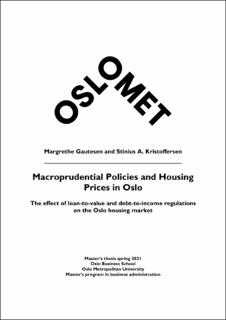| dc.description.abstract | As a result of the severe consequences of the financial crisis in 2008, together with a recent
rise in housing prices and household debt, Norway has imposed several macroprudential
policies to limit the buildup of financial imbalances. The effect of such policies is yet to be
understood sufficiently. This thesis examines the effect of the macroprudential policies
imposed in Norway. Specifically, we investigate how loan-to-value regulations and debt-toincome
regulations have influenced the selling price of dwellings in Oslo. Using highresolution
data on housing trans-actions in Oslo, we employ hedonic regression and
regression discontinuity designs to uncover the effect of the regulations. We find that the loanto-
value regulation caused the selling price of dwellings to fall three weeks before the
implementation of the policy. However, the effect is short lived, as the price development
continued upwards only three months after the implemen-tation. Further, we find that the debtto-
income regulation had a slower effect on the housing prices, causing the price
development to fall three months after the policy was implemented. Moreover, using
supplemental time series regression, we find that the debt-to-income policy may have had a
more long-term effect on the housing market than the loan-to-value policy. | en_US |
